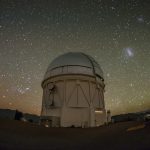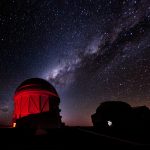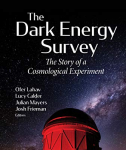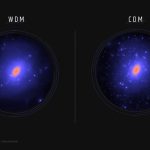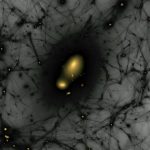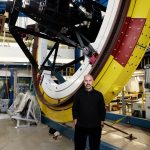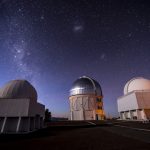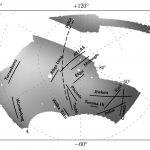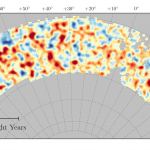The Dark Energy Survey (DES) Collaboration announced the latest results combined weak lensing and galaxy clustering and incorporated four dark energy probes from a single experiment for the first time. This is the culmination of more than 20 years of work by the DES, which was proposed in 2005. Fermilab led the construction of the… More »
DES
The Dark Energy Survey (DES) released new results today using the largest ever sample of galaxies observed over an enormous piece of the sky to produce the most precise measurements of the universe’s composition and growth to date. DES scientists (include many scientists at Fermilab) measured that the way matter is distributed throughout the universe… More »
Fermilab CPC postdoc Antonella Palmese was recently awarded a NASA Hubble Fellowship (read more here). Here research with the Dark Energy Survey (DES) and the Dark Energy Spectroscopic Instrument (DESI) connects gravitational-wave sources, galaxy evolution, and the large-scale structure of the Universe. As an Hubble/Einstein Fellow, Antonella will be moving to the University of California,… More »
The Dark Energy Survey book is out! “The Dark Energy Survey: The Story of a Cosmological Experiment” tells the story of the DES project from original conception, the design and construction of DECam, early science results, and cosmological measurements with the first year of DES data. The book includes chapters written for a non-specialist reader… More »
Scientists in the Dark Energy Survey released results that have been five years in the making. Researchers used the world’s most complete census of dwarf galaxies around our Milky Way galaxy to probe the nature of dark matter, an invisible form of matter that dominates the universe. These new measurements provide information about what dark matter… More »
Over the past five years, the Dark Energy Survey, a DOE-funded project led by Fermilab, has revolutionized our view of small satellite galaxies. DES discovered a large number of tiny galaxies close to the Milky Way’s largest satellites, the Magellanic Clouds, suggesting that multiple galaxies may have been captured by the Milky Way at the… More »
The Department of Energy has awarded Fermilab and University of Chicago scientist Josh Frieman $1 million over three years as part of the inaugural Office of Science Distinguished Scientist Fellowship program. Office of Science distinguished scientist fellows were chosen from nominations submitted by nine U.S. national laboratories. Frieman is one of only five scientists selected,… More »
Why is our universe accelerating in its expansion? If Einstein’s theory of general relativity is correct, then the dark energy that drives this expansion accounts for nearly 70% of the total energy in the universe. However, precise measurements of the history of this expansion may reveal that new dynamic forces are in play. The Dark… More »
Also announces discovery of eleven stellar streams, evidence of small galaxies being eaten by the Milky Way At a special session held during the American Astronomical Society meeting in Washington, D.C., scientists on the Dark Energy Survey (DES) announced today the public release of their first three years of data. This first major release of… More »
New result rivals precision of cosmic microwave background measurements, supports view that dark matter and dark energy make up most of the cosmos Imagine planting a single seed and, with great precision, being able to predict the exact height of the tree that grows from it. Now imagine traveling to the future and snapping… More »










